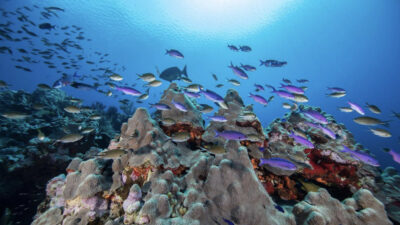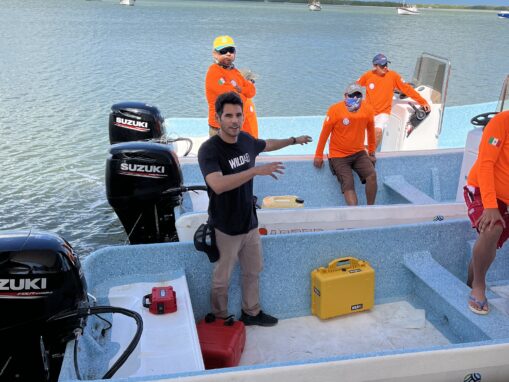
By Ahmed Burad-Mendez, Mexican Program Coordinator, WildAid
Coral reefs are one of the most biologically diverse and critical ecosystems on Earth. Around 25% of all marine life including sharks, sea turtles, seahorses, octopuses, and more are dependent on coral reefs at some point in their life cycle.
Reefs also help protect coastal infrastructure and prevent loss of life from storms, tsunamis, floods, and erosion.
Despite their value, coral reefs are disappearing due to threats like pollution, disease, climate change, and destructive illegal fishing. Our planet has lost 50% of its coral reefs since 1950.
Read on to learn how our marine team is safeguarding one of Mexico’s most important coral reefs and the vulnerable marine life who live there:
Mexico’s Yucatán coastline has 240 miles of white sand beaches, turquoise waters, and stunning wildlife. Yet its marine life and coral reefs are in jeopardy. Until recently, illegal fishing was rampant, and lobster, octopus, and shark populations were dwindling. Local communities were struggling to safeguard critical marine protected areas like Scorpion Reef National Park, despite strong government regulations in place.
As a marine biologist and dive master, I‘ve been diving, studying, and working in Scorpion Reef and surrounding waters for most of my life. The largest coral reef in the Western hemisphere begins here, and the Yucatán’s shore is lined with mangrove forests and seagrass beds.


In 2020, we formed a partnership between local fishing cooperatives, law enforcement, and WildAid to provide the training and resources needed to identify and intercept illegal vessels in the area.
I remember a hot and sticky day on the Yucatán Peninsula when I surfaced from a dive and climbed aboard our patrol boat. I checked my messages and heard a member of the local fishing cooperative had called to report illegal fishing. We jumped into action and called the Fishing Federation. Within the hour, local authorities had routed a patrol boat to identify the illegal vessel. This was the moment I knew our hard work was paying off.
Before they partnered up with WildAid, members of the local fishing cooperatives regularly spotted illegal, destructive fishing activity. But they had limited ability to stop it. If I had made that same phone call to report an unpermitted fishing vessel just 5 years ago, it would have been days before action was taken.
Today, local fishermen and law enforcement coordinate marine enforcement efforts with training and equipment from WildAid. They work together to stop destructive fishing practices and give marine life the chance to regenerate. WildAid provides the training, coordination, and equipment (outboard motors, fuel, safety and surveillance technology) we need to protect the ocean life we love and depend on.
I have hope. I’ve logged countless hours on the water, and I’ve been amazed at the improved health of our coral reefs and the increase in sea turtle sightings and local seabird populations.
Worldwide, 60% of marine protected areas do not have effective surveillance or enforcement. They lack the protection they need to stop rampant and damaging illegal fishing and safeguard surviving corals and marine life. They are protected areas in name only. Together, we are changing that.
Your donation to WildAid brings marine protection and enforcement to coral reefs and other fragile ocean habitats worldwide.
Stay in touch and get the latest WildAid updates.
SIGN UP